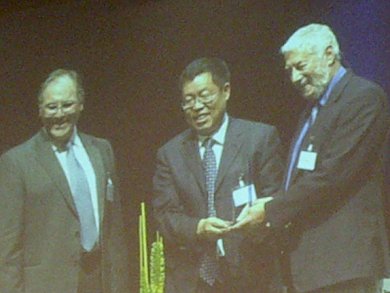Image: (left to right) Professors Alexis T. Bell, University of California, Berkeley, USA, Can Li, Dalian Institute of Chemical Physics and Chairman of International Association of the Catalysis Societies (IACS), China, Graham J. Hutchings, Cardiff Catalysis Institute, Cardiff University, UK.
Professor Graham J. Hutchings, Cardiff Catalysis Institute, Cardiff University, UK, has received the Heinz Heinemann Award of the International Association of Catalysis Societies (IACS). The award was presented at the 15th International Congress on Catalysis (ICC 2012) in Munich, Germany, on July 5th.
Hutchings delivered an award lecture on catalysis using gold nanoparticles. He showed how supported AuPd nanoparticles can be made and used and how the particle size and composition can be controlled. AuPd nanocrystals show remarkable activity as redox catalysts.
Heinz Heinemann (1913–2005) was a co-founder of the Philadelphia Catalysis Club, the Catalysis Society of North America and the ICC, serving as its president from 1956 to 1960. He worked for several petroleum companies in Louisiana and Texas and after retirement, he was a long-time lecturer in the College of Chemistry at the University of California, Berkeley, and a chemistry researcher at Lawrence Berkeley National Laboratory.
 Graham J. Hutchings studied chemistry and gained his Ph.D. from University College London, UK. He joined ICI, Teesside, UK, as Scientific Officer and later as Research and Production Manager. He left industry in 1984 to take up a position as Assistant Director, Leverhulme Centre for Innovative Catalysis, University of Liverpool, UK. In 1997, he moved to Cardiff University where he is Professor of Physical Chemistry and Director of the Cardiff Catalysis Institute.
Graham J. Hutchings studied chemistry and gained his Ph.D. from University College London, UK. He joined ICI, Teesside, UK, as Scientific Officer and later as Research and Production Manager. He left industry in 1984 to take up a position as Assistant Director, Leverhulme Centre for Innovative Catalysis, University of Liverpool, UK. In 1997, he moved to Cardiff University where he is Professor of Physical Chemistry and Director of the Cardiff Catalysis Institute.
His research focuses on gold nanoparticles as catalysts, the design of selective oxidation and hydrogenation catalysts, and chirally modified zeolite catalysts for enantioselective hydrogenation.


